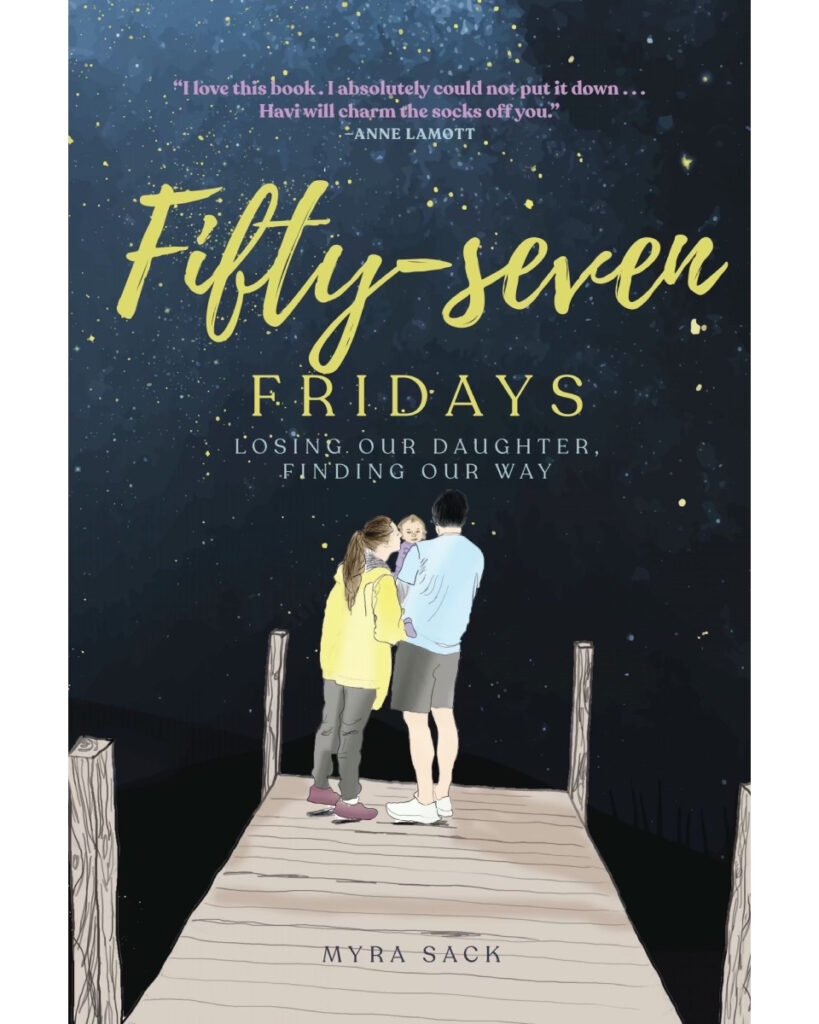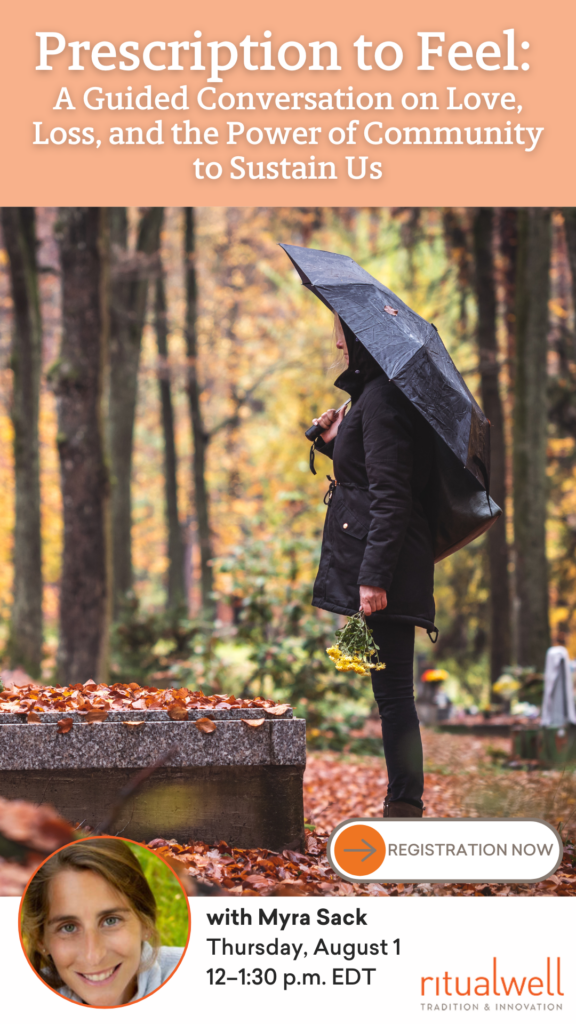Myra Sack, a scholar-athlete who turned her love of sport into a passion for social change, knows what it means to have her world turned upside down. After losing her child, she’s suffered the kind of loss most people cannot even fathom, yet she’s also discovered that by telling her daughter’s story, she can help others process grief.
Sack, author of the new memoir of love and loss, Fifty-Seven Fridays: Losing Our Daughter, Finding Our Way, will be teaching as part of Ritualwell’s online offerings. She will speak about how community and creative ritual helped her family muddle through profound tragedy. “Prescription to Feel: A Guided Conversation on Love, Loss, and the Power of Community to Sustain Us” will take place Aug. 1 at 12 p.m. Register here.
Just five years ago, tragedy was the furthest thing from her mind. Sack and her husband, Matt, were the parents of a beautiful, healthy 1-year-old daughter, Havi Lev Goldstein. Then, on Dec. 17, 2019, the couple received the most devastating news: Havi was diagnosed with Tay-Sachs, a terminal neurogenerative disorder prevalent among Ashkenazi Jews. Before conceiving, Myra and Matt had undergone genetic testing and were told they weren’t at risk of transmitting Tay-Sachs. Myra knew she was a carrier, but they were told that Matt wasn’t. There’d been a terrible mistake. Havi wouldn’t live to see her third birthday.
I want to teach grief literacy. I want to help people learn a language of loss — help people understand that they can have practical skills and tools that they can use and take comfort in.
Myra Sack
Very quickly, the couple decided they had one course of action: celebrate every moment of Havi’s short life and envelope her with love. By the first Friday after the diagnosis, they created a new Jewish ritual: the Shabbirthday. While Havi only had two actual birthdays, she had 57 Shabbirthdays in which she was surrounded by friends and family in love and got to eat her favorite food, challah.
Havi passed away on Jan. 20, 2021. Since then, Myra has given birth to two healthy children, Kaia and Ezra. After delving into the science and literature of grief, Sack has become a certified compassionate bereavement-care provider. She also founded the nonprofit, E-Motion, an organization she designed that integrates movement and grief to support coping capacity.
The Boston-area resident was raised in the Philadelphia suburbs; her first Hebrew school director was Cyd Weissman, Reconstructing Judaism’s vice president for innovation and impact. Sack recently sat with Reconstructing Judaism staff members Bryan Schwartzman and Sam Wachs.
Bryan: What do you hope participants might take away from your Ritualwell session?
Myra: There are multiple components. One is the opportunity to share my story of loss with people who might feel some resonance because they, too, are Ashkenazi Jewish or they, too, have experienced loss.
Another is that I want to teach grief literacy. I want to help people learn a language of loss — help people understand that they can have practical skills and tools that they can use and take comfort in. The third part is that there is this beautiful opportunity to express grief through writing and to give people an opportunity to practice with some prompts and some guided reflections.
Bryan: With the Shabbirthday, you and Matt created a new Jewish ritual. Was this a conscious choice? How did you come up with the idea?
Myra: When we got Havi’s diagnosis of Tay-Sachs, I couldn’t wrap my head around Havi only having two birthdays on Earth. Maybe at the deepest, most cellular level, this was me calling upon my Judaism and making Judaism work for me in this phase that was totally tragic and apocalyptic.
It was a question of: How were we going to honor her regularly and frequently enough? And squeeze in a full lifetime. And what we knew was that only going to be, you know, two-plus years, if we were lucky. There was a desperation and craving and yearning for more sacred time and space to honor this beautiful person.

Then we just started thinking about things like: What did she love?
She loved challah. We would go and pick up a loaf at this bakery about 12 minutes from our house — Rosenfeld’s Bagels in Newton, Mass. The challah is incredible. Here was this delicious food that was grounded in Judaism that we could have every Friday that was two pieces of the puzzle for us that we just said, “Oh my God, OK, we’ll like totally blow out Shabbat, and we’ll make it your birthday.”
And we won’t use that time and space to pretend our pain away or somehow mask our anguish. We’ll use that time and space to say: OK, we can do this. We can get from one Shabbirthday to the next, and we can make time stand still at those Shabbirthdays, and we got 57 of them.
We can do this. We can get from one Shabbirthday to the next, and we can make time stand still at those Shabbirthdays, and we got 57 of them.
Mayra Sack Tweet
Bryan: It sounds like in the three years since losing your daughter, you’ve leaned into learning about grief and helping others move through it.
Myra: I think that sadly, some aspects of our Western culture are fairly grief-illiterate or afraid to really lean into topics around grief and loss. It’s hard for grieving people to navigate their own feelings and experiences, and find people or places that they can turn to where they feel seen and safe.
In my case, I was incredibly lucky that my sister-in-law found our grief therapist, Dr. Joanne Cacciatore, a teacher who wrote Bearing the Unbearable and is a traumatic grief scholar. And it was in her book that — for the first time since Havi was diagnosed — I really felt like someone was seeing me and seeing this whole experience in a way that made me feel safe.
And after I read her book, I was determined to find more authors, more scholars, more work that resonated. And so, I did. And that was a personal education journey that I went on. And then I went and got trained by Dr. Cacciatore, who trains providers or practitioners, in her compassionate bereavement-care model. And I learned right alongside her because she was the scholar and the clinician who I trusted most to guide me. My goal is to help grieving people feel like they are being supported rather than pitied.
Bryan: What role has writing played in your grieving and healing process?
Myra: Writing wasn’t always something that I relied on or even knew that I liked or needed. It became very clear that when we had a child who couldn’t speak, finding other ways to communicate with her that felt authentic was life-sustaining.
It felt like I could write to Havi, and I could almost hear her. There was something about writing that almost felt egalitarian, like she could share in this experience because I wasn’t asking her to respond. I was just trusting that she was feeling my words, and I still write to her. I start every entry with “Dear Beauty” and just tell her what’s going on.
Bryan: Can you talk about the role that Judaism has played in this long healing process? I understand that Rabbi Shelly Barnathan, a Ritualwell contributor, was instrumental during this time.
Myra: She was quite special and extraordinary during Havi’s diagnosis, her death and then life after she died. Rabbi Shelly honored Havi’s bat mitzvah — her 13th Shabbirthday — with a special service.
It was just exquisite in the way that she turned towards what might have been scary and uncomfortable, and helped us feel safe. She brought Judaism into it in a way that felt right for us and that matched what we needed.
And I think that that’s so much of what Reconstructionist Judaism is. It’s about how to make things relevant and present. And so, after Havi died, I’d meet with Rabbi Shelly on Zoom. She would share blessings and create space for reflection.









